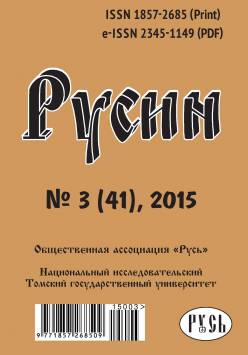Slavic Version of the Idea of "Central Europe": Czeslaw Milosz
The article discusses the idea of "Central Europe" as a culture-generating space of Slavic peoples in Europe in the essays of the Polish poet, a Nobel Prize winner Czeslav Milosz. The cultural identification of the Slavs in the center of Europe, who found themselves in the sphere of influence coming from totalitarian political and ideological systems (German and Russian totalitarianism; fascist and communist ideologies) is still relevant within the context of the globalism of the modern civilization. The conception of Europeism of the culture of minor Slavic nations, Polish in particular, formed on the basis of the Roman branch of Christianity is contrasted with Russian culture following the traditions of Gnosticism that formed a radical attitude to man and the world. At the same time, Milosz debunks the myth about Russia as a barbarous and Asiatic culture while finding the ideological principles of Russian civilization: universalism, maximalism, hope for universal truth and salvation, accepting a sacrifice for the sake of the Absolute, and others. The article discusses the sources of Milosz's conception of Europe as a free union of different minor ethnicities with different languages and traditions. Milosz's idea is shown to go back not to the political idea of "Central Europe" (Friedrich Neumann's "Mitteleuropa", 1915), but to the conception of Stanislav Vincenz's "Europe of Homelands," i.e. the union of "malych kraikow"-"minor homelands". Milosz insists on the meaning of the "minor homeland" as a factor of natural and polycultural social milieu that provides a personal place in world cultures in the native cultural space. The right for the personal cultural identification is given by the states that are not based on the principle of monoculture (Vilnius and Polish-Lithuanian Commonwealth are examples, according to Milosz). The countries of Central Europe located on the crossing of cultures and fallen to the imperial ambitions of different states during different periods of history, have been keeping the traditions of their own culture in a polycultural milieu. Milosz believed that the mission of minor Slavic states in the center of geographical Europe is to join different cultural traditions and translate European traditions to the global world. If during the period of communist dictatorship the countries that became a part of "Eastern Europe" were forced to be oppositional to Russian culture as that of empire and defend their right to develop their own national and European traditions, in post-communist Europe, the Slavs were to become the keepers of high culture traditions on guard against the unification and mingling of cultures coming with the civilization of multi-culturalism. One of the missions of Slavic peoples is to become a mediator between Western Europe and Russia that passes the experience of high Russian culture (first of all, Russian 19th-century literature) to the European tradition.
Keywords
Чеслав Милош, европейская культура, русская цивилизация, малая родина, личностная культурная самоидентификация, Czeslav Milosz, European culture, Russian civilization, minor homeland, personal cultural identificationAuthors
| Name | Organization | |
| Rybalchenko Tatyana | Tomsk State University | talery.48@mail.ru |
References
_9_2015_1443412755.jpg)
Slavic Version of the Idea of "Central Europe": Czeslaw Milosz | Rusin. 2015. № 3 (41).
